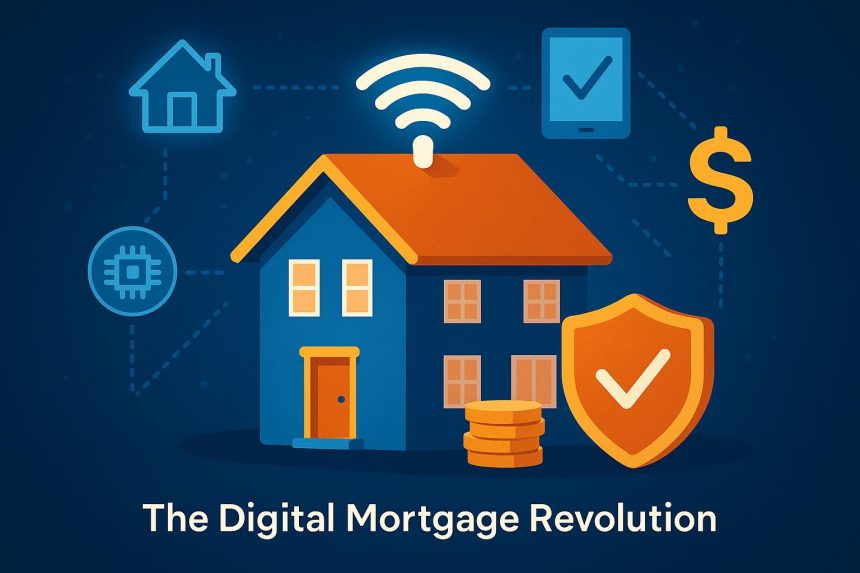The mortgage industry is transforming anything seen before. With digital mortgages making home financing faster and more data-driven, the rise of smart home technology is beginning to play a new role in how properties are evaluated and funded. For those interested in exploring how these trends are shaping the housing market, read more about how lenders are adapting to innovation. From underwriting to alternative lending models, connected devices and energy-efficient upgrades may soon reshape not just the way people live in their homes, but also the way lenders and investors make decisions.
Digital Mortgages Meet Smart Homes
Digital mortgages are streamlining everything from application to closing, cutting down paperwork and accelerating approvals. What makes this shift even more exciting is the overlap with smart homes. Connected devices, such as energy-efficient thermostats, security systems, and water leak detectors, generate real-time data that can help lenders assess the property’s safety and sustainability. When combined with digital mortgage platforms, this data can create a more complete picture of risk and value than ever before.
Data-Driven Underwriting
Traditional underwriting has relied on borrower credit scores, income documentation, and property appraisals. However, as smart homes become more prevalent, data from connected systems may influence how lenders assess risk. For instance, a home equipped with advanced security systems may be considered lower risk, while one with proven energy efficiency could signal reduced operating costs for the borrower. By factoring in these details, lenders may one day tailor loan terms, such as lower interest rates or higher loan-to-value ratios, for homes that demonstrate smart, efficient, and safe performance.
How Loan Terms Could Shift
If smart technology can verify lower risks, borrowers may benefit directly in the form of better loan conditions. Energy-efficient upgrades, such as solar panels or smart HVAC systems, can lower utility bills, thereby improving a homeowner’s overall financial profile. To understand how these trends are shaping lending opportunities, read more about the connection between sustainable homes and favorable loan terms. For lenders, this means borrowers may have more disposable income to meet their mortgage obligations. This alignment of borrower affordability and property sustainability could pave the way for innovative financing models that reward technology-based risk reduction with tangible savings.
New Financing Models on the Horizon
Beyond traditional banks, alternative financing solutions are well-positioned to embrace these changes. Hard money lenders, for example, already prioritize speed and flexibility over rigid criteria. As the value of smart home data becomes more widely accepted, these lenders may adapt the fastest, offering favorable terms for properties with connected features. For real estate investors, especially those using hard money loans, this creates a distinct advantage. By upgrading properties with smart systems, they can not only boost resale value but also potentially secure better financing terms in a competitive market.
What This Means for Investors
For investors, the digital mortgage revolution, combined with the adoption of smart homes, offers more than just efficiency. It creates an opportunity to stand out in a crowded real estate market. Buyers are increasingly drawn to homes that are energy efficient, secure, and technologically advanced. Investors who embrace these upgrades may not only appeal to future homeowners but also find financing partners who recognize the reduced risk. By aligning property improvements with evolving lending models, investors can future-proof their strategies while maximizing returns.
Final Thoughts
The intersection of digital mortgages and smart home technology signals a future where property financing is both faster and smarter. Lenders like Lantzman Lending will have more tools to assess risk, borrowers may enjoy better terms, and investors who act early can gain a significant advantage. As alternative lenders adapt quickly to these shifts, opportunities will grow for those willing to embrace both innovation and flexibility. The mortgage landscape is changing, and smart homes are one of the most influential forces shaping the way people buy, finance, and invest in real estate.
Lynn Martelli is an editor at Readability. She received her MFA in Creative Writing from Antioch University and has worked as an editor for over 10 years. Lynn has edited a wide variety of books, including fiction, non-fiction, memoirs, and more. In her free time, Lynn enjoys reading, writing, and spending time with her family and friends.















